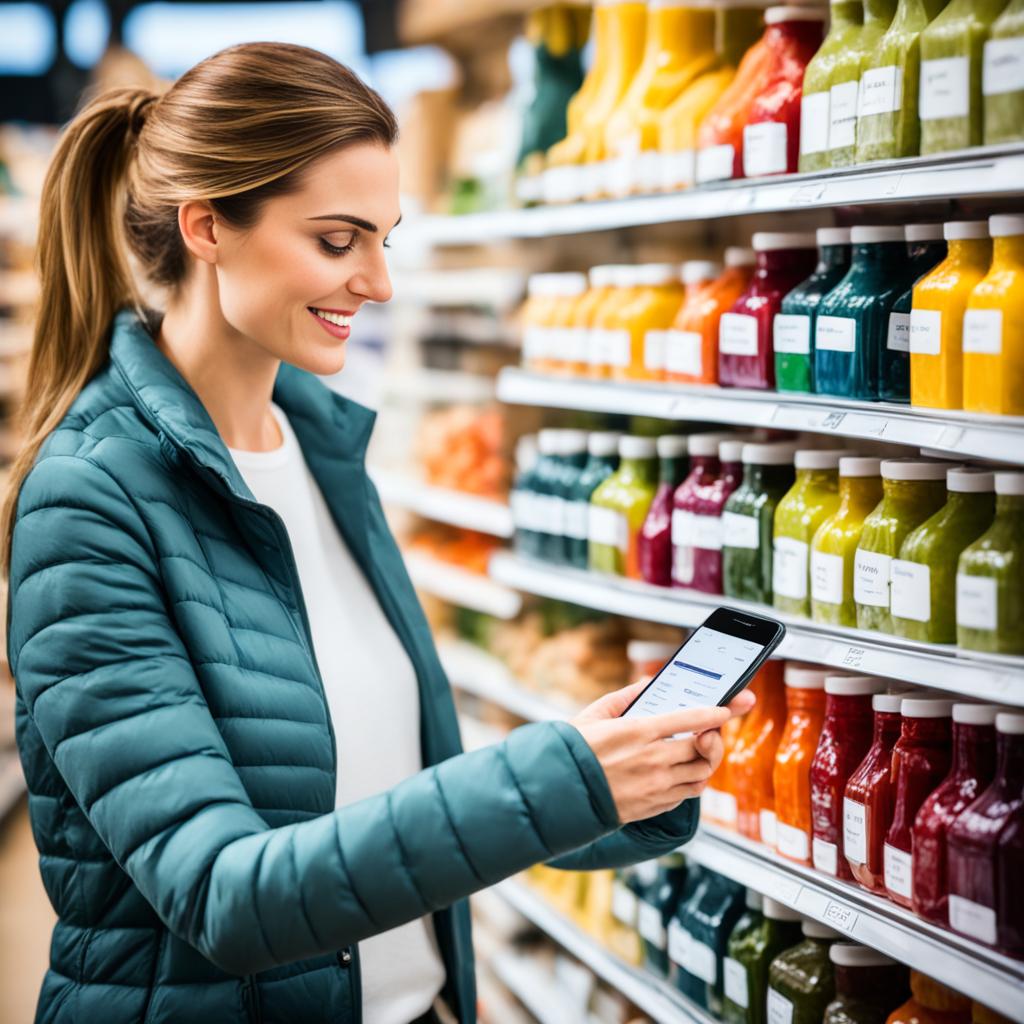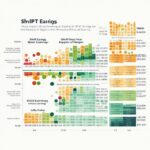Are you looking for a flexible way to earn extra income? A side hustle as a personal grocery shopper might be just what you need. As a personal shopper, you can help busy individuals and families with their grocery shopping needs, earning money while providing a valuable service. Whether you’re interested in a grocery shopper side hustle, a grocery delivery gig, or simply making extra income by shopping for groceries, this article will guide you through the process.
Key Takeaways
- Starting a side hustle as a personal grocery shopper can be a profitable way to earn extra income.
- Apps like Instacart, Shipt, and WeGoShop can help you find clients and streamline the shopping process.
- Create a solid business plan to identify potential clients and set financial goals.
- Choose a catchy name for your personal shopper business to establish a strong brand presence.
- Select the most appropriate business structure for your personal shopper business, considering factors such as liability and taxes.
Create a Business Plan for Your Personal Shopper Business
Before embarking on your personal shopper business journey, it’s essential to have a well-crafted business plan in place. A comprehensive business plan will help guide your actions, ensure you stay on track, and increase your chances of success. Here are some key steps to consider when creating your personal shopper business plan:
Identify Your Target Market
Understanding your target market is crucial for finding the right clients and effectively marketing your services. Consider the demographic and psychographic characteristics of potential clients who would benefit from a personal shopper. This could include busy professionals, elderly individuals, or individuals with specific dietary needs. By honing in on your target market, you can tailor your services and marketing efforts to appeal to their specific needs and preferences.
Develop a Marketing Strategy
Once you have identified your target market, it’s time to develop a marketing strategy to reach potential clients. While personal shopper apps like Instacart, Shipt, and WeGoShop can help you find clients, it’s also beneficial to build your own client base through other channels. Consider leveraging social media platforms, creating a professional website, and networking within your local community. Word-of-mouth referrals can be particularly powerful in this line of work, so provide exceptional service to encourage satisfied clients to recommend your services to others.
Set Pricing and Financial Goals
Understanding the potential income of a personal shopper is vital for setting your prices and financial goals. Research the rates charged by other personal shoppers in your area to get an idea of industry standards. Consider factors such as the time spent on each shopping trip, mileage, and any additional services or perks you offer. Ensure that your pricing structure allows for profitability while remaining competitive in the market. It’s also wise to set financial goals for your personal shopper business, whether that’s a specific income target each month or a milestone you’d like to reach within a certain timeframe.
| Income Potential | Client Acquisition Strategy |
|---|---|
| On average, personal shoppers can earn between $14.64 and $20 per hour. | Personal shopper apps (e.g., Instacart, Shipt, WeGoShop) |
| Social media marketing and creating a professional website | |
| Word-of-mouth referrals and networking within your local community |
By implementing a well-thought-out business plan, you can position yourself for success in the personal shopper industry. From identifying your target market to setting financial goals, each step plays a crucial role in building a thriving personal shopper business.
Select a Name for Your Personal Shopper Business
When starting a personal shopper business, one of the key considerations is selecting a name that not only represents your brand but also leaves a lasting impression on potential clients. A well-chosen name can help attract customers and differentiate your business from competitors in the market.
As you brainstorm ideas for your personal shopper business name, it’s important to keep your target audience in mind. Think about the tone and vibe you want your name to convey, as well as the type of clients you aim to attract. Whether you’re aiming for a fun and playful name or a more sophisticated and professional image, make sure it aligns with the overall branding strategy of your business.
Checking Availability and Trademarking
Before settling on a name, it’s crucial to perform a thorough search to ensure it is not already in use by another business in the same industry. Conduct a search on local directories, online platforms, and social media to see if any similar names or identical trademarks already exist.
To further protect your business, you may consider trademarking your chosen name. This helps safeguard your brand identity and prevents others from using the same or a similar name, which could lead to confusion among customers.
Securing the Domain Name
In today’s digital age, having a strong online presence is essential for businesses. When choosing a name, it is wise to check the availability of the corresponding domain name. Securing a domain name that matches your chosen business name or closely relates to it can help establish consistency across your online platforms, such as your website and social media profiles.
Moreover, owning the domain name strengthens your control over your brand’s online presence, preventing others from using a similar domain name that could potentially divert traffic or confuse customers.
To ensure branding continuity and a strong online presence, it is advisable to choose a personal shopper business name that has an available trademark and corresponding domain name.
“A strong personal shopper business name not only captures the essence of your brand but also helps attract clients and differentiate you from your competition.”
| Advantages | Considerations |
|---|---|
| Creates a memorable brand identity | Should align with your target audience’s preferences |
| Helps attract potential clients | Needs to differentiate your business from competitors |
| Can be trademarked for brand protection | Must be checked for availability and not infringe on existing trademarks |
| Allows for consistent online branding | Should have a corresponding available domain name |
An effective personal shopper business name not only resonates with your target audience but also helps establish a strong brand identity that sets you apart in the market. By considering availability, trademarks, and securing the corresponding domain name, you can lay a solid foundation for your personal shopper business and effectively communicate your unique value proposition to potential clients.
Choose a Business Structure
When starting your personal shopper business, it’s essential to choose the right business structure to fit your needs. The business structure you select will have implications for aspects such as personal liability, taxation, and scalability. Here are three common options to consider: sole proprietorship, limited liability company (LLC), and corporation.
Sole Proprietorship
If you’re looking for a simple and cost-effective structure, a sole proprietorship might be the right choice for your personal shopper business. As a sole proprietor, you have complete control over your business and its operations. However, it’s important to note that you will have unlimited personal liability for any business debts or legal obligations.
Limited Liability Company (LLC)
An LLC combines the simplicity of a sole proprietorship with the added protection of limited liability. As the owner of an LLC, your personal assets are separate from your business assets, which can help protect your personal finances. Additionally, an LLC offers flexibility in terms of management and taxation.
Corporation
If you’re thinking of scaling your personal shopper business and attracting outside investors, forming a corporation might be the most suitable structure. A corporation is a separate legal entity, which means it can enter into contracts, own property, and be liable for its debts and obligations. However, forming a corporation involves more administrative formalities and ongoing compliance requirements.
Before deciding on the right business structure for your personal shopper business, it’s crucial to consider your long-term goals, financial situation, and the level of personal liability you’re comfortable with. Consulting with an attorney or tax professional can also provide valuable guidance in making this important decision.
Legally Form Your Personal Shopper Business
Once you’ve decided on a business structure, you will need to complete the necessary paperwork to legally establish your personal shopper business. The specific requirements and filing processes may vary depending on your chosen business structure. For example, forming an LLC involves filing articles of organization with the state. It’s important to comply with all legal obligations to protect yourself and your business.
Forming a personal shopper business requires attention to detail and adherence to specific legal procedures. To ensure you navigate this process correctly, it’s highly recommended to consult with a qualified attorney or business professional to provide you with proper guidance.
“Properly forming your personal shopper business is essential to establish a strong foundation for your entrepreneurial journey. This process involves filing the appropriate paperwork, ensuring compliance with local regulations, and protecting your personal assets. As a personal shopper, taking these legal steps sets you up for success and ensures you can focus on growing your business.”
Depending on your chosen business structure, you may need to consider the following:
1. Sole Proprietorship:
If you decide to operate as a sole proprietorship, you may not have to file any specific paperwork to legally establish your business. However, it’s still important to check the local regulations and obtain any necessary licenses or permits.
2. LLC Formation:
If you opt for the added protection and flexibility of forming a limited liability company (LLC), the process typically involves the following steps:
- Choose a unique name for your LLC that complies with your state’s regulations.
- File the necessary paperwork, such as the Articles of Organization, with the appropriate state agency. This usually involves providing information about your business, including its name, address, owners, and the purpose of the company.
- Publish a notice of your intent to form an LLC in a local newspaper or online publication, as required by some states.
- Create an Operating Agreement that outlines the internal operations of your LLC, including member roles, decision-making processes, and profit distribution.
Each state has its own specific requirements and fees for LLC formation. Make sure to research and comply with the regulations in your state to ensure a smooth and legally compliant process.
Forming your personal shopper business as an LLC offers several advantages, including personal liability protection and potential tax benefits. This business structure separates your personal assets from your business assets, limiting your personal liability in case of legal issues or debts related to the business. Consulting with a legal professional can provide valuable insights into the advantages and requirements of this business structure.
Remember, the specific process of legally forming your personal shopper business may vary depending on the laws and regulations of your location. It’s always recommended to consult with a legal professional to ensure you’re following the correct procedures and protecting your interests.
Create Internal Policies and Procedures
As a personal shopper, it’s important to establish clear internal policies and procedures for your business. These guidelines will help maintain consistency, professionalism, and ensure smooth operations. Depending on your business structure, you may also need to establish partnership agreements, operating agreements, or bylaws.
Through the development of internal policies, you can define the standards and expectations for your personal shopper business. This includes guidelines for order fulfillment, customer communication, and conflict resolution. By creating a comprehensive set of policies, you can ensure that every customer receives a consistent and high-quality experience.
To provide further structure and legal protection for your business, you may need to establish partnership agreements or operating agreements. These agreements outline the rights, responsibilities, and potential liabilities of each partner or member of the business. By formally documenting these agreements, you can prevent misunderstandings and potential disputes in the future.
Here’s an example of an internal policy you might consider implementing:
“All personal shoppers must confirm delivery instructions with the customer prior to leaving the store. In the event that an item is out-of-stock, personal shoppers should take note and inform the customer immediately to discuss potential replacements.”
Creating internal policies and procedures not only provides structure for your business but also gives you peace of mind knowing that you have a clear framework in place. These guidelines help you make informed decisions, maintain professionalism, and deliver exceptional service to your customers.
| Key Benefits of Internal Policies and Procedures: |
|---|
| 1. Consistency: Establishing clear guidelines ensures that all personal shoppers deliver a consistent experience to customers. |
| 2. Professionalism: Internal policies set the standards for professionalism, enabling you to maintain a positive reputation. |
| 3. Conflict Resolution: Procedures for resolving disputes or conflicts with customers help maintain customer satisfaction and preserve business relationships. |
| 4. Legal Protection: Partnership agreements, operating agreements, or bylaws provide legal protection and define the responsibilities of all parties involved. |
What are Personal Shopper Apps?
Personal shopper apps have revolutionized the way people hire personal shoppers. These apps provide a convenient platform that connects customers in need of grocery shopping assistance with qualified shoppers who can fulfill their shopping needs on-demand. In the past, personal shoppers were often accessible only to the wealthy, but with the emergence of apps like DoorDash, Shipt, and Favor, personal shopping has become more affordable and widespread.
“Personal shopper apps have transformed the gig economy, making it easier than ever for individuals to earn extra income by providing grocery delivery services.”
These personal shopper apps operate within the gig economy, which refers to the flexible work arrangements where individuals can engage in short-term, freelance-style jobs. By utilizing these apps, shoppers can tap into the gig economy and leverage their shopping skills to earn income on their own terms.
Whether you’re a stay-at-home parent looking for a way to make money during spare hours or a college student seeking a flexible part-time job, personal shopper apps offer an opportunity to become an integral part of the grocery delivery service industry.
Personal shopper apps enable customers to place orders through the app, specifying their grocery items and any specific requirements. Shoppers, who have registered on the app and undergone a vetting process, can view available orders and accept the ones they wish to fulfill.
These apps provide a streamlined process for both parties involved. Customers can enjoy the convenience of getting their groceries delivered, while shoppers can take advantage of the flexibility to choose their working hours and locations. The apps also handle payment processing, ensuring a hassle-free experience for shoppers and customers alike.
Advantages of Personal Shopper Apps
There are several advantages to using personal shopper apps:
- Increased accessibility: Personal shopper apps open up the opportunity for individuals from diverse backgrounds to enter the grocery delivery service industry.
- Flexible hours: Shoppers can set their own working hours and choose when to accept orders, allowing for greater work-life balance.
- Additional income: Personal shoppers have the potential to earn extra income by providing shopping and delivery services.
- Convenience for customers: Personal shopper apps offer customers the convenience of having their groceries delivered right to their doorstep.
Disadvantages of Personal Shopper Apps
While personal shopper apps offer many benefits, there are a few potential disadvantages to consider:
- Variable income: Earnings as a personal shopper may vary depending on the number of orders fulfilled, tips received, and market demand.
- Vehicle wear and tear: Personal shoppers who use their own vehicles for deliveries may experience increased mileage and depreciation.
- Independent taxation: As independent contractors, personal shoppers are responsible for managing and reporting their income for tax purposes, which can be more complex than traditional employment.
| Advantages | Disadvantages |
|---|---|
| Increased accessibility | Variable income |
| Flexible hours | Vehicle wear and tear |
| Additional income | Independent taxation |
| Convenience for customers |
How Do Personal Shopper Apps Work?
Personal shopper apps have revolutionized the way shoppers connect with customers, simplifying the process of fulfilling orders and ensuring efficient communication. Here’s how these apps work:
1. Order Placement and Acceptance:
Customers place their orders through the app, specifying their desired items and delivery preferences. Shoppers receive notifications of available orders and can choose to accept or decline based on their availability and location.
2. Seamless Communication:
The app serves as a communication platform between shoppers and customers, enabling seamless coordination. Shoppers can clarify any preferences, substitutions, or special instructions directly with the customer, ensuring a personalized shopping experience.
3. Efficient Order Fulfillment:
Once the shopper accepts an order, they proceed to the assigned store to begin shopping. They navigate the aisles to find the requested items, ensuring accuracy and quality. The app may provide a shopping list or suggest specific products based on customer preferences or previous orders.
4. Delivery and Customer Satisfaction:
Once the shopper completes the shopping process, they proceed to deliver the order to the customer’s specified location. The app may provide navigation assistance to ensure timely and efficient deliveries. Shoppers strive to provide excellent service and address any customer queries or concerns.
5. Payment and Tips:
Shoppers are typically paid per delivery or receive a base payment plus incentives based on factors such as distance or order size. In addition to the delivery fee, shoppers can also earn tips from satisfied customers. These payments are often processed through the app’s payment system, ensuring a secure and convenient transaction process.
By streamlining the personal shopper experience, these apps prioritize convenience and customer satisfaction, providing a seamless process from order placement to delivery.

Best Personal Shopper Apps for 2024
If you’re considering becoming a personal grocery shopper, there are several popular apps that can help you connect with clients and streamline your workflow. Here are the best personal shopper apps to consider for the year 2024:
- DoorDash
- Shipt
- Favor
- Burpy
- TaskRabbit
| App | Requirements | Payment Structure | Availability |
|---|---|---|---|
| DoorDash | Valid driver’s license, reliable vehicle | Earn per delivery + tips | Available in numerous cities across the U.S. |
| Shipt | Reliable transportation, valid driver’s license, smartphone | Earn per order + tips | Available in select cities and states |
| Favor | Reliable vehicle, smartphone | Earn per delivery + tips | Available in select cities in Texas |
| Burpy | Reliable vehicle, smartphone | Earn per order + tips | Available in select cities in Texas and surrounding areas |
| TaskRabbit | Varies depending on the task | Earn hourly or based on the task | Available in multiple cities across the U.S. |
Note: Availability may change over time, so it’s important to visit the respective app websites for the most up-to-date information.
Each app has its own unique set of requirements, payment structure, and availability. It’s essential to research and choose the best fit for your needs. Consider factors such as geographic coverage, compensation methods, and any specific vehicle or device requirements. With the right app, you’ll have access to a large customer base and a convenient platform to manage your personal shopping gigs.
Let’s take a closer look at some of these personal shopper apps:
DoorDash
DoorDash is a widely recognized app that offers food delivery services, but it also has an option for personal shoppers to fulfill grocery orders. Their platform allows you to accept or decline orders, and you’ll earn money for each delivery completed. DoorDash operates in numerous cities across the United States, making it a popular choice for aspiring personal shoppers.
Shipt
Shipt focuses exclusively on grocery delivery and has a network of personal shoppers who fulfill orders for customers. As a Shipt shopper, you’ll have the flexibility to create your own schedule and earn money per completed order. While Shipt is available in select cities and states, it continues to expand its coverage, making it an attractive option for those looking to enter the personal shopping space.
Favor
Favor is known for its delivery services, including groceries, and operates mainly in Texas. As a Favor runner, you’ll use your own vehicle to pick up and deliver orders. The app allows customers to request almost anything, from groceries to takeout, and you’ll earn money for each delivery completed. If you’re based in Texas, Favor can be a great app to consider for personal shopping gigs.
These apps, along with Burpy and TaskRabbit, offer personal shoppers a range of opportunities to connect with clients and earn income. By understanding the requirements, payment structures, and availability of each app, you can make an informed decision and choose the best personal shopper app for your needs in 2024.
How Do You Get Personal Shopper Jobs?
To become a personal shopper, you need to meet certain requirements set by the apps or companies you’re interested in working for. These requirements typically include:
- Age restrictions: Most personal shopper apps require shoppers to be at least 18 years old.
- Vehicle ownership: Depending on the app, you may need a reliable vehicle to transport groceries to customers.
- Background checks: To ensure safety and trustworthiness, background checks are often conducted on potential shoppers.
- Smartphone compatibility: Personal shopper apps rely on smartphone technology, so you’ll need a compatible device to receive orders and communicate with customers.
Once you meet the requirements, you can sign up for the app or apply for a position as a shopper. Keep in mind that each app or company may have its own specific application process and additional qualifications to consider.
For example, Instacart, a popular personal shopper app, requires shoppers to:
- Have a valid driver’s license and consistent access to a vehicle.
- Be able to lift and carry heavy items, as grocery bags can be bulky.
- Be allowed to work in the United States and pass a background check.
- Possess a smartphone that is compatible with the app.
By fulfilling these requirements, you can start your journey as a personal shopper and take advantage of the opportunities available in the gig economy.
How Much Can You Make as a Personal Shopper?
The earning potential of a personal shopper can vary based on several factors. The app or company you work for, the number of orders you fulfill, and the tips you receive all contribute to your income as a personal shopper.
On average, personal shoppers can earn between $14.64 and $20 per hour. However, it’s important to note that this range can fluctuate depending on the demand for personal shopping services during peak periods. With high demand, you have the potential to earn even more.
Understanding the payment structure of the app or company you choose to work with is crucial. Some personal shopper apps pay per delivery, while others offer additional incentives such as bonuses or referral programs. Additionally, tips from satisfied customers can significantly boost your earnings.
As with any side hustle or gig economy job, it’s important to manage your expectations and set realistic income goals. While personal shopping can provide a reliable source of extra income, it may not replace a full-time job. However, with dedication and excellent customer service, you can maximize your earning potential as a personal shopper.
Now, let’s take a closer look at the pros and cons of using personal shopper apps and explore the advantages and disadvantages of this popular side hustle.
Personal Shopper Earnings
| Hourly Earnings | Income Potential |
|---|---|
| $14.64 – $20 | Potential for higher earnings during peak demand periods |
Pros and Cons of Personal Shopper Apps
Like any side hustle or gig economy job, personal shopper apps have their pros and cons. Let’s take a closer look at the benefits and disadvantages of using these apps.
Benefits of Personal Shopper Apps
- Flexibility: One of the major advantages of personal shopper apps is the flexibility they offer. You have the freedom to choose your own hours and work whenever it’s convenient for you. This is particularly beneficial for those who have other commitments or prefer a non-traditional work schedule.
- Be Your Own Boss: As a personal shopper, you are essentially running your own business. You have control over how you provide your services, the clients you work with, and the overall direction of your business. This independence can be empowering and rewarding.
Disadvantages of Personal Shopper Apps
- Variable Income: Personal shopper app earnings can be unpredictable. Your income will depend on the number of orders you fulfill, the tips you receive, and the demand for personal shopping services in your area. This variability may make it difficult to consistently budget or plan your finances.
- Vehicle Wear and Tear: As a personal shopper, you will be responsible for using your own vehicle to fulfill orders. This can result in increased wear and tear on your car, including mileage, maintenance, and potential accidents. It’s important to factor in these additional expenses when considering the profitability of the gig.
- Tax Obligations: Working as a personal shopper means you are responsible for handling your own taxes. This includes setting aside money for self-employment taxes, keeping track of expenses, and filing accurate tax returns. It’s crucial to understand your tax obligations to avoid any legal or financial issues.
Considering these factors, it’s important to weigh the pros and cons before deciding if a personal shopper side hustle is right for you. The flexibility and independence can be enticing, but it’s essential to be prepared for the potential challenges that come with it.
| Pros | Cons |
|---|---|
| Flexibility | Variable Income |
| Be Your Own Boss | Vehicle Wear and Tear |
| Tax Obligations |
Conclusion
Starting a side hustle as a personal grocery shopper can be a smart and lucrative way to earn extra income. The growth of personal shopper apps has opened up countless opportunities to connect with clients and provide them with a valuable service. However, it’s important to approach this venture with a solid understanding of the business side.
Creating a well-thought-out business plan, choosing the right business structure, and complying with legal requirements are crucial steps to ensure your success as a personal shopper. By carefully considering the advantages and disadvantages, you can find the best fit for your skills and goals, and turn grocery shopping into a thriving side hustle.
Remember, as a personal shopper, you have the freedom to set your own hours and be your own boss. This flexibility offers a level of control and independence that many people find appealing. However, it’s important to keep in mind that the income can vary and there might be additional expenses such as vehicle maintenance. Additionally, you’ll need to handle your own taxes, so it’s important to understand the financial implications of this side hustle. In conclusion, the potential for success is there, and with the right approach, you can turn your personal shopping skills into a profitable side gig.
FAQ
What is a personal shopper?
How do I start a side hustle as a personal grocery shopper?
How can I find clients for my personal shopper business?
What should I consider when choosing a name for my personal shopper business?
What business structure should I choose for my personal shopper business?
What paperwork do I need to complete to legally establish my personal shopper business?
Why is it important to develop internal policies and procedures for my personal shopper business?
What are personal shopper apps?
How do personal shopper apps work?
What are the best personal shopper apps for 2024?
How do I qualify to become a personal shopper?
How much can I make as a personal shopper?
What are the pros and cons of personal shopper apps?
Source Links
- https://www.northwestregisteredagent.com/start-a-business/ideas/personal-shopper
- https://millennialmoneyman.com/personal-shopper-apps/
- https://www.nerdwallet.com/article/finance/instacart-shopper-make-money
Money posts:
 Instacart Shopper Review: Is Instacart Worth it in 2024?
Instacart Shopper Review: Is Instacart Worth it in 2024?
 How to Become a Shipt Shopper (2024 Guide)
How to Become a Shipt Shopper (2024 Guide)
 How Much do Instacart Shoppers Make in 2024?
How Much do Instacart Shoppers Make in 2024?
 Shipt Shopper Review: Is Working for Shipt Worth It? (2024)
Shipt Shopper Review: Is Working for Shipt Worth It? (2024)
 12 Places to Get a Money Order Near Me (2024)
12 Places to Get a Money Order Near Me (2024)
 Instacart Shopper: Legit Side Hustle or Waste of Time?
Instacart Shopper: Legit Side Hustle or Waste of Time?
 Shipt Review – Should You Become a Shipt Shopper?
Shipt Review – Should You Become a Shipt Shopper?
 How Much Do Shipt Shoppers Make in 2024?
How Much Do Shipt Shoppers Make in 2024?

